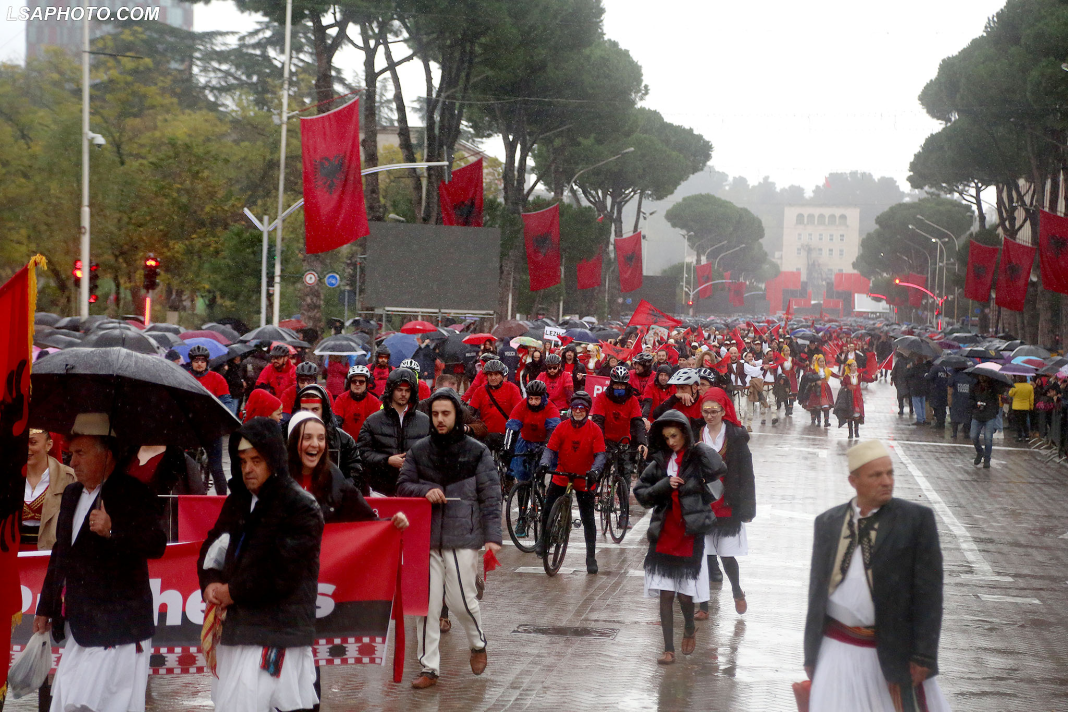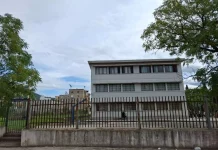After a decade, which includes promises in two electoral campaigns to enable the diaspora vote (recently supported by public statements from Prime Minister Edi Rama), the Socialist Party has submitted a draft law for changes to the Electoral Code for the 2025 parliamentary elections at the last minute (without the consensus of the largest opposition party).
Nevila Gjata
‘This is the last time you won’t be able to vote directly from where you are, brothers and sisters in the diaspora, because we have begun a colossal task to register Albanians abroad.’
This is what Prime Minister Rama promised before the 2017 parliamentary elections. The fact is that in the general elections held on April 25, 2021, for the new Assembly, the diaspora did not vote. The question now is whether they will be able to vote in the 2025 general elections?
The amendments proposed by the Socialist Party focus only on the obligation to reformulate certain provisions of the Electoral Code, according to the reasoning and rulings of the Constitutional Court on two issues: enabling the diaspora vote and ensuring the proportionality of the quotient for the distribution of mandates within the same electoral entity based on the preferential vote given by the voters.
In this article, Faktoje.al is focused on one issue: the diaspora vote, which the parties have acclaimed for years. However, this month (July 2024), this process has been narrowed down to just three amended articles of the current Electoral Code. And, above all, without consensus.
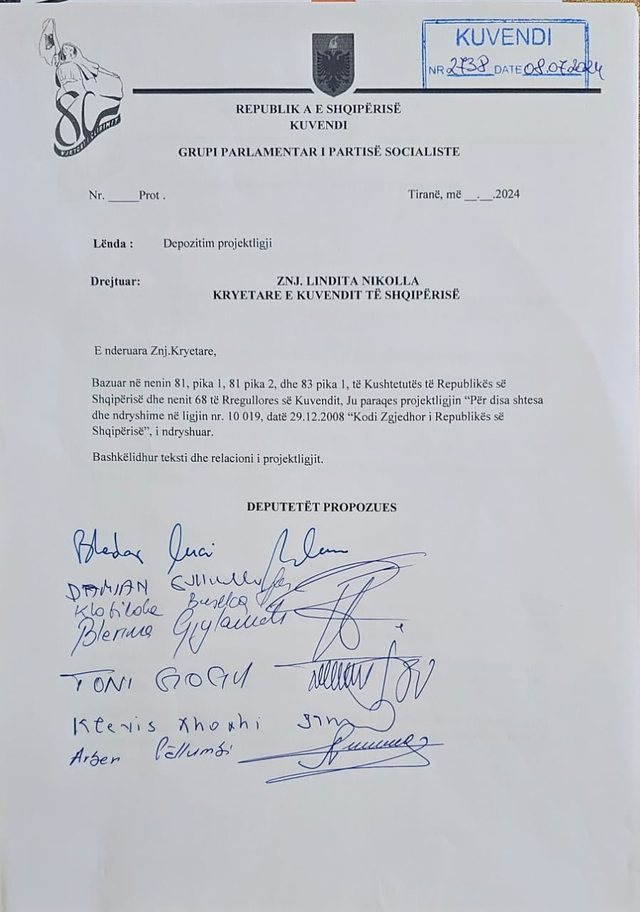
Amendments
In simple terms, according to the draft law submitted by the Socialist Party, voting from abroad shall be organized and overseen by the Central Election Commission (CEC), as specified in the current provisions of the Code.
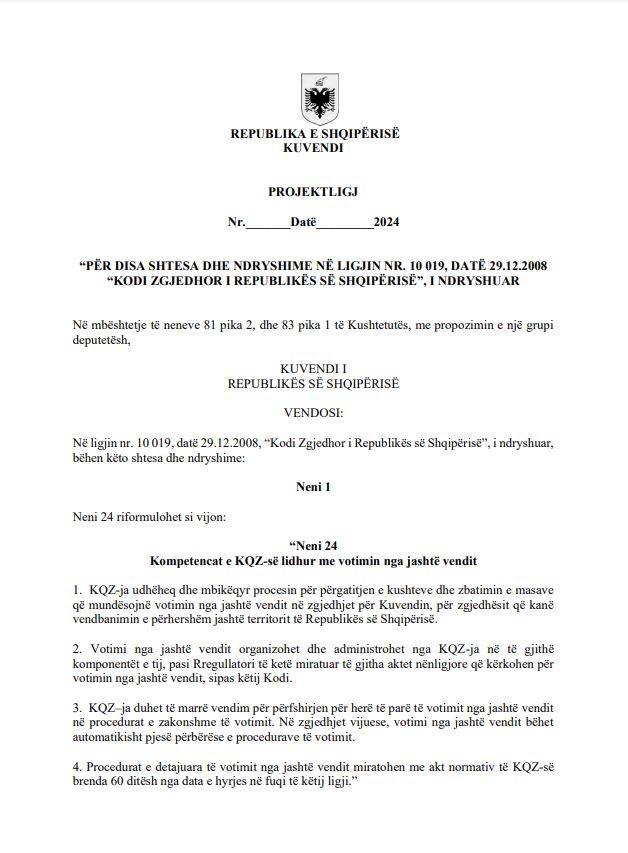
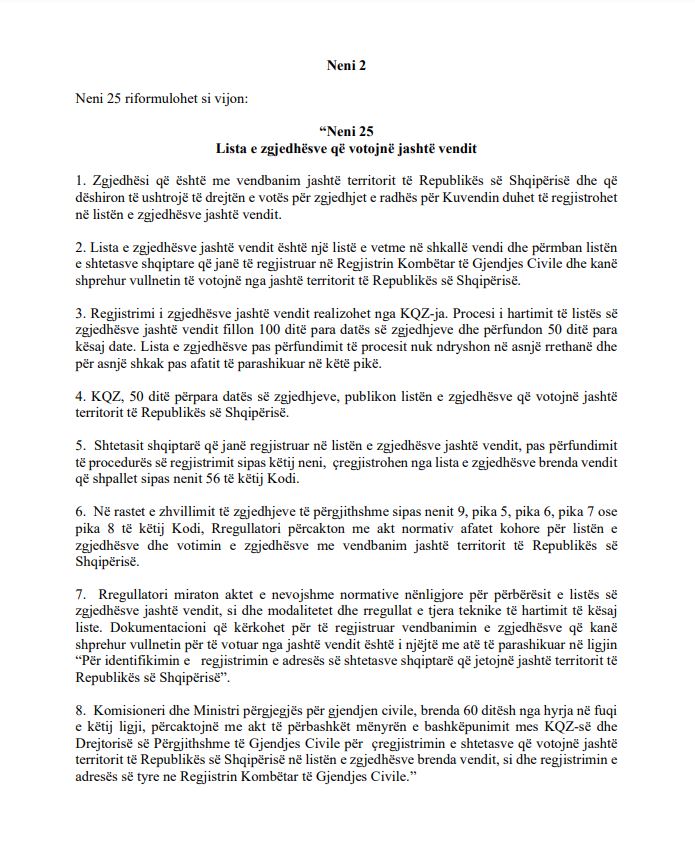
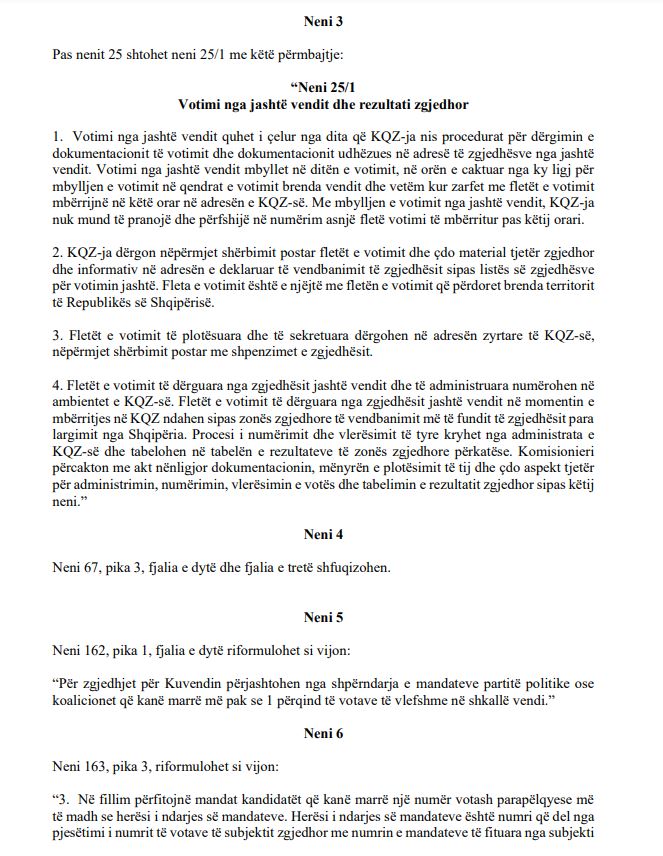
The process will be conducted via postal service and not electronically. The latter was the most likely option (though not the only one) previously proposed by Chief Commissioner Ilirjan Celibashi.
A voter residing outside the territory of the Republic of Albania who wishes to exercise their right to vote in the upcoming Assembly elections must register on the list of voters abroad.
Currently, the list of voters abroad is a single nationwide list that includes Albanian citizens who are registered in the National Civil Registry and have expressed their intention to vote from outside the territory of the Republic of Albania.
This means that the list of voters from abroad includes only those voters residing abroad who request the CEC to provide them with the documentation for voting from abroad. (Currently, 10,300 are registered)
Once the process is completed, the list of voters does not change under any circumstances and for any reason after the deadline specified in this document.
The documentation required to register the residence of voters who have expressed their intention to vote from abroad is the same as that stipulated in the law ‘On the identification and registration of the address of Albanian citizens living outside the territory of the Republic of Albania.’
The CEC sends the ballots and all other electoral and informational materials via postal service to the declared residence address of the voter according to the list of voters for voting from abroad. The ballot is the same as the one used within the territory of the Republic of Albania.
Moreover, the completed ballots are sent to the official address of the CEC via postal service at the voter’s expense.
It is also important to note that the ballots sent by voters from abroad, upon arrival at the CEC (where they will also be counted), will be sorted according to the electoral zone of the voter’s last residence before leaving Albania.
But is this the most feasible option?
Kristaq Kume, a well-known election expert with significant experience, including past leadership of the CEC, argues in a statement to Faktoje.al that the proposed option is one of the variants and, compared to what is currently stipulated in the Electoral Code, it does not differ in essence. ‘Especially in the requirement stipulated in the Code and included in this proposal, which is the registration of the voter’s permanent address in the emigrant address register here in Albania as a necessary condition.’
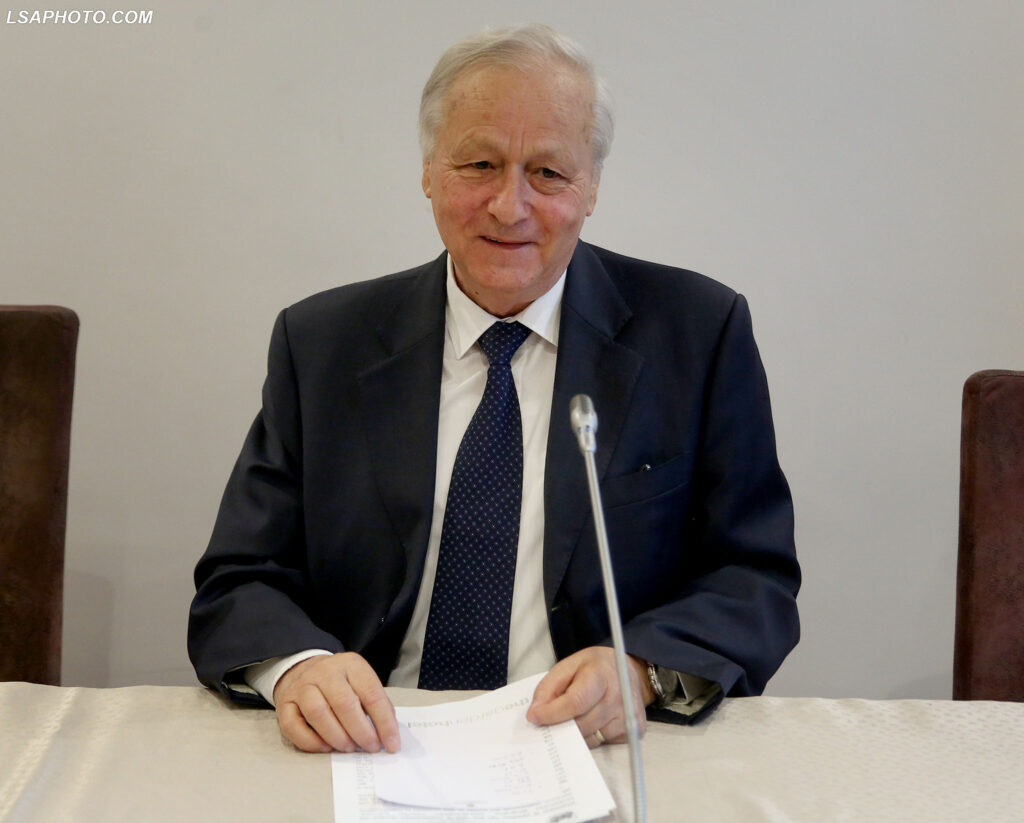
If this obligation is not fulfilled, according to him, you cannot vote.
‘Unlike the way it is treated in the Electoral Code, this proposal addresses only the voting of emigrants and not the voting of citizens from outside the territory,’ Kume notes.
What does this mean? ‘If a citizen is not in Albania on election day but is with their relatives (having gone there earlier), they cannot vote from abroad even if they express the desire to vote because their residence address is here.’
‘In 2025, we will implement voting from outside the country, but the number of voters will be relatively small or much smaller compared to their potential number because, above all, even in the socialists’ proposal, the condition that must be met is preserved; you must have registered your address here in Albania. Referring to the voting process, those who wish to vote must declare their permanent address along with all the necessary information stipulated in the law on the emigrant address register approved in 2016. Thus, 100% of what is fixed in the relevant provision in the Electoral Code as the necessary condition for voting from abroad is preserved,’ says Kume.
Is postal voting the best solution under ‘Albanian’ conditions? Does it avoid abuses and consequently disputes from the parties, and by which service should it be conducted, Albanian or foreign?
‘The postal voting method is one of the most frequently used methods in other countries as well. Naturally, as highlighted, it is important that the competing parties, that is, the ruling party and the opposition, agree on this voting method. I expect such an agreement to be reached. And it should not be a task assigned to the Albanian postal service, but to a foreign postal service.’
Voting also comes with costs…
‘Considering the cost associated with this voting method, especially given what is expected to happen—that this service will be carried out by a foreign postal service—the SP has proposed that the cost be shared between the state and the voter. That is, the voter would pay the postal service fee to send the ballot,’ notes Kume.
Is this process complete with all the necessary components, and can it serve as a long-term solution even after 2025?
The Analyst, Afrim Krasniqi, initially tells Faktoje.al that the SP proposal comes at the last minute, more as a move to attract attention.

Krasniqi views this as an electoral tactic to increase parliamentary seats in favor of the party rather than a genuine solution or real representation for the diaspora.
‘If the proposal goes through and the SP manages to secure 84 votes to amend the Electoral Code, it would enable the SP and its structures, particularly in Greece, to gain a large number of votes, potentially earning them three to five seats. However, this does not ensure real participation of the diaspora in the country’s political life nor real representation in our electoral and political system.
Since Albania is different from other countries due to its very high percentage of citizens living abroad (around 40-45%), the issue of diaspora representation should also have been addressed.
Will there be an electoral zone like in Croatia where the diaspora is represented, or will we have other mechanisms with temporary quotas or other forms of representation?!
The SP proposal is for the distribution of votes according to districts, which neither makes the vote proportional nor realistically increases the visibility of the diaspora’s presence in elections. Moreover, it risks identifying some voters from specific districts in Albania because their votes are directed to the district, thus not ensuring real representation or the integrity of the Constitutional Court’s decision,’ he says.’
‘What does 2025 foretell from Krasniqi’s perspective?
‘Next year will not see a real vote from the diaspora, but rather an effort to distort the concept of diaspora voting into short-term electoral calculations,’ he replies.
Why?
‘Unfortunately, the majority lacks transparency and a long-term solution to this issue, despite having it in their electoral program for two campaigns. The opposition, on the other hand, also lacks such an approach and a concrete proposal.
The diaspora is seen as a threat by both sides, and they are trying to find ways to keep them away while benefiting from tactical schemes to represent only their political supporters active in the diaspora,’ Krasniqi notes.
A serious state, according to him, should have agreements with countries where Albanian emigrants reside to facilitate the administrative procedures of voting and registering the citizens living there.
Currently, Albania has no discussions, let alone agreements, with any European country regarding the diaspora vote.
‘A serious state should have established a register of citizens living abroad, which is why we created the Ministry of Diaspora, but this has not been accomplished. Albania is the only country in Europe that fails to meet these two criteria, resulting in the diaspora vote being a missed opportunity. This doesn’t even address other issues such as how the voting process will be conducted, how the electoral campaign will be monitored abroad, how the right to personal voting will be ensured versus clientelist and family voting, how certain groups—possibly extremist or with other motives—will influence the promotion or mobilization of votes in specific communities that are dependent on the official policies of their respective states, and how the issue of voting in parliamentary and local elections will be resolved. Additionally, how will the diaspora be represented on political party lists, given that under current conditions, we link the representation of candidates to being in Albania, meaning residing only within the national territory,’ outlined Krasniqi.’
Aside from the open discussions, another question arises: is there enough time to implement this process for the 2025 elections?
The Head of the Central Election Commission, Ilirjan Celibashi, contacted by Faktoje.al, did not comment on the SP proposal due to the nature of the entire process. However, in a public statement to the media, he noted that the diaspora voting should have been included in the law a year ago.
‘We would have preferred that, as the Constitutional Court determined, the amendments for voting from abroad were made a year ago. We are very late, but in one way or another, we should address this issue that others have created for us,’ said Celibashi.
The time to address this issue is only within this month, meaning within this parliamentary session.
‘The time available to implement it, as the state commissioner has stated, is sufficient if the decision is made within this month in Parliament,’ Kume emphasized.’
84 Votes
Is there a willingness to pass it as a package within this timeframe, or will the diaspora vote end up as propaganda once again?
Oerd Bylykbashi did not give a concrete answer when asked by the media about the DP’s stance on this document (signed only by seven SP deputies).
To pass the changes to the Electoral Code, the SP needs 84 votes, which (as of the publication of this article), it does not have.
The DP has not yet provided an official response, and officially it has not signed the preliminary SP draft law for the diaspora.
Lulzim Basha, on behalf of the group he leads, has contested the draft because, according to him, it does not include other important conditions for the elections such as open lists.
Work Calendar
It is also worth noting that the draft law for some changes to the Electoral Code has not been included in the voting calendar for this month.
A general overview of the Parliament’s work calendar for July shows that the draft law is not on the agenda for the sessions on July 15th, July 18th, or July 25th. If there is a will, it can be introduced this month only through an expedited procedure.
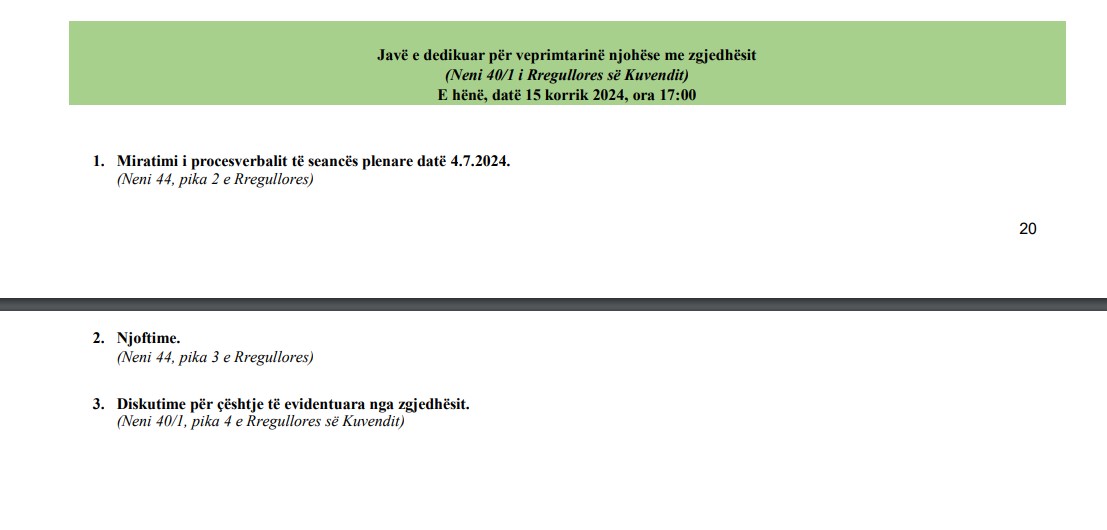
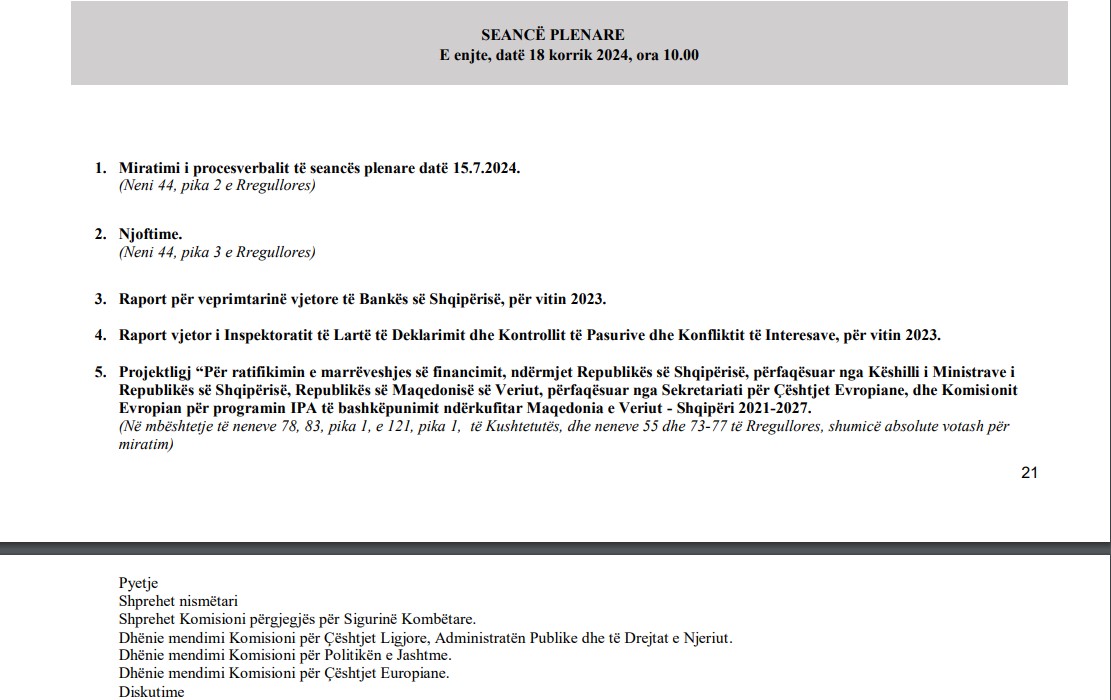
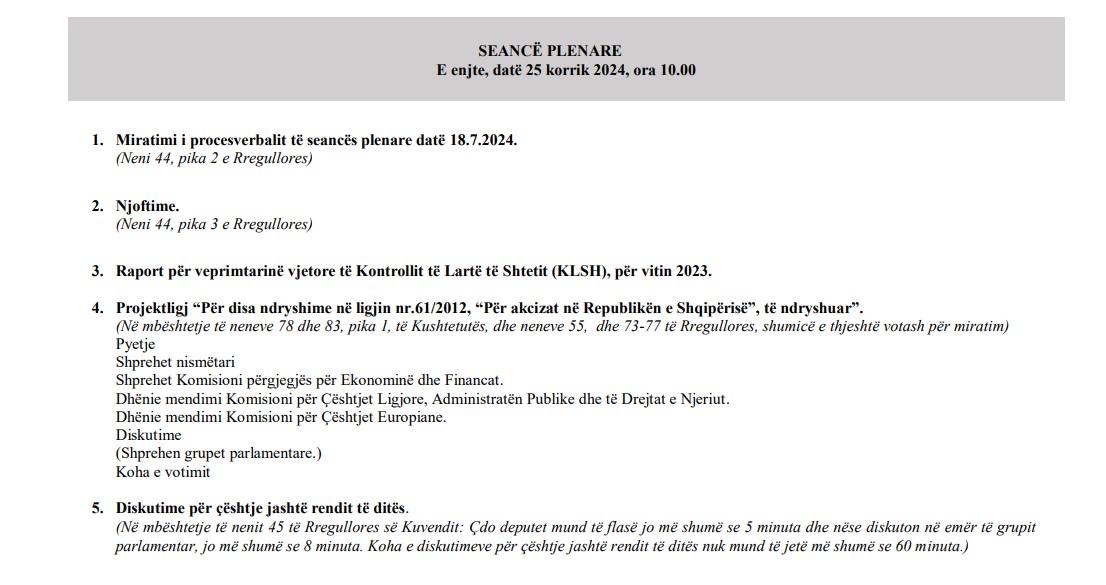
What We Know
In 2016, a law was passed to register Albanians living abroad. However, the law was not implemented. In 2017, Prime Minister Edi Rama established the Ministry for Diaspora through a government decision, with the task of ‘coordinating the process to ensure the registration and the voting rights of the diaspora.’ This process failed. The ministry was downgraded to a directorate, currently under the Ministry of Foreign Affairs.
Compared to the data published from the 2011 Census to that of 2023, the population of Albania has decreased by 420,000 people.
Currently, Albania has 2.4 million residents, of which 1.8 million are of voting age.
According to the latest Census data, for the generation born in 1990, the emigration rate is 61%.

